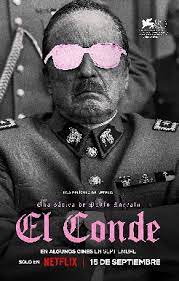
EL CONDE
Chile, 2023, 110 minutes, Black-and-white.
Jaime Vadell, Gloria Munchmeyer, Alfredo Castro, Paula Luchsinger, Stella Gonet, Catalina Guerra, Amparo Noguerra, Antonio Zegers, Marcial Tagle, Diego Munoz, Clemente Rodriguez.
Directed by Pablo Larrain.
If you came across a news item or headline about this latest film from distinguished Chilean director, Pablo Larraiin, the immediate reaction might be to wonder what has happened to his mind. You would read that he has decided to dramatise and interpret the dictator, Pinochet, as a vampire. And he has made the film, using Pinochet’s chosen description of himself as a Count, El Conde. Vampire Pinochet.
For older audiences who may remember the Pinochet years in Chile, from 1973 to 1989, at time of repression, thousands of disappeared, ruthlessness, and his avaricious acquiring of hidden wealth, the vampire analogy may not seem so absurd. Larrain himself was born in 1974 and so grew up during this period, and dramatised aspects of this in his films, Tony Manero and, especially his film about elections in the 1980s, No. (Audiences not familiar with his Chilean films will be interested to remember that he directed a portrait of Jackie Kennedy, Jackie with Natalie Portman, and, more recently, Spencer, Princess Diana played by Kristin Stewart.)
Does the analogy work? Pinochet, as played by Hymie the Dell who more than resembles the older Pinochet, is sinister and self-seeking. There is also a portrait of his wife, seen here as also avaricious, unfaithful, longing for her husband to bite her neck and vamp arise her, but he refuses. He has a sinister Igor equivalent, a Russian exile, fired or. And, later in the film, paralleling reality in 2007, his five children assembling to argue about his estate.
But, there is a voice-over, remarkably like the voice and intonations of Margaret Thatcher. Later, she will appear, and, no spoilers now, an interesting relationship with Pinochet, more than when he took refuge in England and had her sponsorship. In fact, the narrative goes back to pre--French revolution days, the young Pinochet dismayed by revolutionaries and wanting them putdown, upset at the death of Marie Antoinette, taking refuge in the desert mountains of Chile.
As we watch, it all becomes rather convincing, presented in stark black-and-white, Pinochet in the desert, but with a capacity for flying over the terrain. And, as if this isn’t enough, a nun is sent to probe the doubledealing finances, but experiences more than she bargained for.
As said, for audiences who remember the period, a challenging opportunity to remember, to be disgusted at the violence and inhumanity of the dictator. For younger audiences, an opportunity to find out something about these tragic moments in Chilean history.
- The premise that Pinochet was a vampire? Credible/preposterous? The imaginative treatment?
- The work of the director, Chilean, his age, the experience of the Pinochet regime, his films, critical of Pinochet, the dramatising of Chile during that era, the aftermath? This film is a later condemnation of Pinochet, as a person, his ambitions, government, corruption, finance, cruelty, murders?
- The black-and-white photography, the 18th century, the Chilean desert, interiors, the elaborate basement of the Desert house? The musical score? Moments of colour at the end?
- The narration, the Margaret Thatcher voice and intonations? The revelation about Margaret Thatcher as a character, her coming to the Desert house, the confrontation, the revelation about her being Pinochet’s mother?
- Going back to the 18th century, the birth of Pinochet, revolutionary France, friendship with Marie Antoinette, her execution, his determination against uprisings and rebels? His vampire behaviour, blood, women, victims?
- Disappearing, reappearing in Chile, the 1960s and 1970s, the Socialist government, Allende, Pinochet and his rise, the coup, the American support? The change of regime? The next 17 years?
- Pinochet and his wife, her support, with him in the desert, her ambitions? Wanting to become a vampire? Her relationship with Fyador? The liaison, the power struggle, confrontations with her husband? His knowing the truth?
- Pinochet, wanting to die, his experiences of living, of being a vampire, weary? Yet still calculating? Not revamp your eyes in his wife?
- The story of come and cheater, the conference, the discussions, singing, the choice of Carmen? Being sent to Pinochet? Financial issues? To bring him down? Taking of the habit, travelling to the desert, the encounters with Pinochet, his being charmed, her examining the books, the encounter with Pinochet’s children, with his wife, the threats about the money? The relationship with Pinochet, becoming a vampire? Her ability to fly, through the skies, over the earth? The reaction of his children, his wife, death?
- Financial issues, the early 20th century, Chile, government, examination of fraud, charging of Pinochet’s children? Their arrival, the different personalities, their meetings, discussions, taunts, controls? Wary of Carmen? The revelations about the financial situation?
- Fyodor, his behaviour, obsequious service of Pinochet, yet with his wife, behind his back, the basement, the contents, the power?
- Pinochet, his ability to fly, over the land, into the sky, the exhilaration?
- The end of his empire, Fyodor, Pinochet’s wife, vampire, confrontation, destruction?
- The arrival of Margaret Thatcher, her taking control, her prime ministerial manner, voice and intonation, clothes, coming to the desert, taking control, the revelation about Pinochet being her son, the flashbacks to the 18th century, her wanting her son back?
- The colour at the end, the change of tone, giving the audience the chance to reflect on their experience and this insight into the character, behaviour, dictatorship of Pinochet?